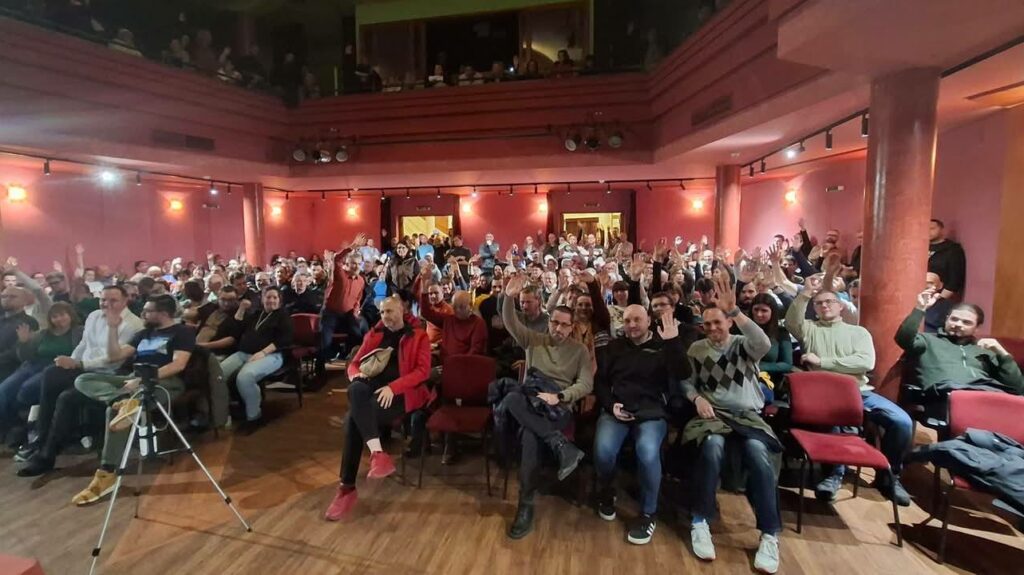The https://english.atlatszo.hu use cookies to track and profile customers such as action tags and pixel tracking on our website to assist our marketing. On our website we use technical, analytical, marketing and preference cookies. These are necessary for our site to work properly and to give us inforamation about how our site is used. See Cookies Policy
Protesting locals successfully halt industrial projets in two rural communities
In two small communities, locals successfully protested disruptive projects: in a Sajóbábony, the construction of an NMP factory, and in Maglód, a South Korean industrial project was prevented as public pressure following Átlátszó’s reporting made the ministry and the local governments change their plans.
The residents of Maglod, Gyömrő and Sajóbábony were not afraid to voice their opposition to developments planned in their municipalities which they considered disturbing or dangerous. But for their protest to succeed, mayors other local politicians had to stand up for residents.

A few weeks ago, we reported that a plan to set up an NMP (the chemical N-Methyl-2-pyrrolidone ) plant in the Industrial Park in Sajóbábony had met with local opposition. A public forum on the project revealed that the majority of locals do not want another dangerous plant in the settlement.
The mayor, István Szilva, who convened the forum, said that the time was not right for a plant to process 50,000 tonnes of N-methylpyrrolidone (NMP) from battery factories a year. He said that the serious problems caused to the population by some of the plants in the Industrial Park, which we also wrote about in a previous article, must be solved first.
No NMP plant to be built for the time being
Following the publication of our article, several local residents informed us that the municipality has taken a favourable decision on the matter. At the first council meeting of this year, the MPs voted in favour of to introduce a ban on alterations to the whole of the industrial park in Sajóbábony, for a maximum period of three years.
The decision was announced on the mayor’s Facebook page. “This means that as of today – until it is revoked – no construction or building work may begin in the Industrial Park,” the mayor wrote in his post.
Although there is no reference to the planned NMP plant in the post, the decision was clearly designed to prevent this investment. And the injunction would presumably not have been issued if the public had not been strongly opposed to the new plant.
Aluminium plant cancelled
Maglód’s residents also voiced their dissatisfaction at a public forum about an industrial plant. As we reported earlier, the forum was about a planned industrial park near a residential area and an aluminium structure plant.
Preparations for the project have already started and a contract has been signed with the South Korean company Samwon Industrial Ltd. However, apart from the disruptive effects of industrialisation and increased traffic, residents also complained that the municipality had not previously provided them with sufficient information about the plans.
The protests also brought fruit in Maglód. Here, the local government has imposed a ban on changes to site the plant was planned at.
According to the information posted on Facebook by Tibor Kerek, a municipal councillor, “the change ban, which covers a maximum period of 3 years, allows the municipality to amend the Local Building Code and the Settlement Structure Plan for the area in a way that does not involve rezoning, does not entail the risk of compensation claims, but allows for rationalisation and mitigation of the buildability of the given economic area.”
Disruptive road also rerouted
Residents have also been protesting for years about a multi-lane motorway planned near family homes in Maglód and Gyömrő. In the summer, locals launched a petition against the 46-kilometre bypass connecting the M0 highway to Nagykáta between Maglód and Gyömrő in 2022. According to them, the planned project, which would also affect the inner areas of the two towns, would generate additional vehicle traffic in the settlements and significantly disturb the peace and quiet of the people living there.
We also reported that the project was granted an environmental permit in 2023, and that the Ministry of Construction and Transport (MCPT) launched a public tender for the additional permits and construction plans, which was won by Főmterv Zrt. with a bid of 2.344 billion euros.
But the public and several local politicians have argued that the road should not be built in this form. Attila Váradi, MP, held a public forum in Gyömrő, and together with the mayors of Maglódi, Gyömrő, Ecseri and Péter, a meeting was held with Péter Ágh, ÉKM’s State Secretary for the Social Coordination of Public Investments.
Then, on 24 January, a local newspaper published a statement issued by the Ministry, according to which “taking into account the requests of the municipal administration and the population, the ÉKM decided not to continue the design work of the design section between road 3111 and the existing main road 31 (Maglód), which includes a bark tunnel, with the current technical content.
According to the statement, the ministry has asked the designer to “develop alternative technical solutions”,
which means that the route of the Maglód-Gyömrő section concerned will be redesigned.
Although an article on the architecture site magyarepitok.hu reported that “a public consultation on the new road was held at the planning stage”, this does not tell the whole story. In reality, the ministry decided to change the plans for the road project only because of consistent protests from residents and the stand of politicians representing the interests of local residents. As for the promised new trail, it is likely that residents will continue to need to make their voices heard.
Written by Zsuzsa Bodnár, translation by Zalán Zubor. The Hungarian version of this story is here. Cover photo: Participants of the public forum on the construction of the road connecting the 3111 and 31 highways between Maglód and Gyömrő, held on 7 January 2025 at the Hankó István Art Centre in Gyömrő.
Share:
Your support matters. Your donation helps us to uncover the truth.
- PayPal
- Bank transfer
- Patreon
- Benevity
Support our work with a PayPal donation to the Átlátszónet Foundation! Thank you.
Support our work by bank transfer to the account of the Átlátszónet Foundation. Please add in the comments: “Donation”
Beneficiary: Átlátszónet Alapítvány, bank name and address: Raiffeisen Bank, H-1054 Budapest, Akadémia utca 6.
EUR: IBAN HU36 1201 1265 0142 5189 0040 0002
USD: IBAN HU36 1201 1265 0142 5189 0050 0009
HUF: IBAN HU78 1201 1265 0142 5189 0030 0005
SWIFT: UBRTHUHB
Be a follower on Patreon
Support us on Benevity!

